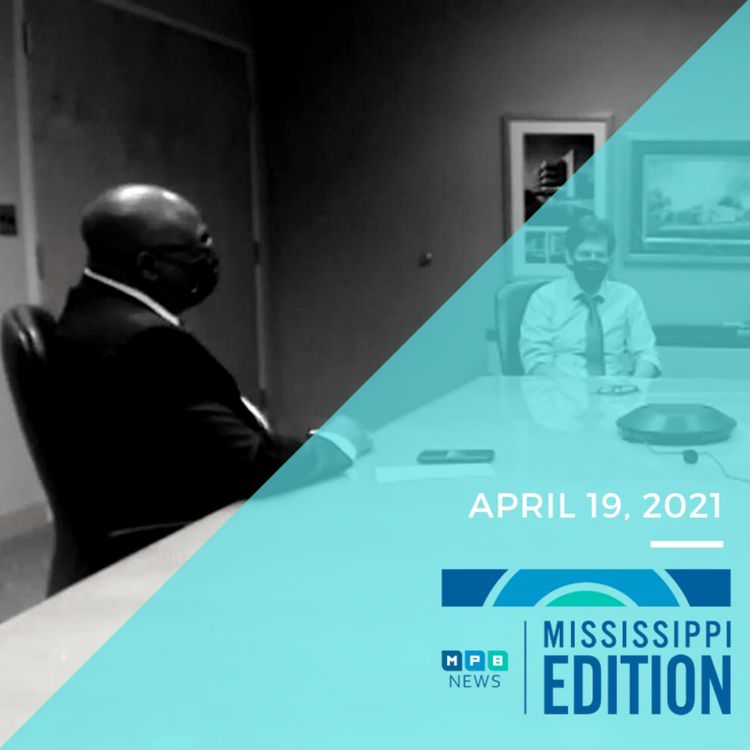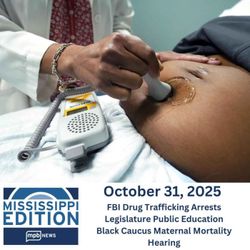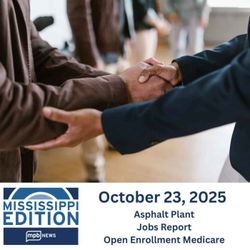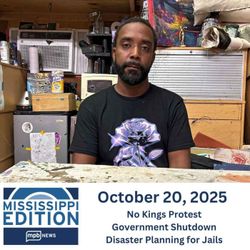Share

Mississippi Edition
4/19/21 - J&J Pause & Effects Monitoring | Vaccinating Rural Communities | Your Vote, Your Voice: Part 4
With the Johnson & Johnson vaccine still on pause, health officials examine vaccination rates and the hesitancy factor.
Then, from the Gulf States Newsroom, how partnerships with community health centers are reaching rural residents in the region.
Plus, in part four of You Vote, Your Voice, we explore how those with felony convictions lose access to the ballot.
Segment 1:
The vaccination in Mississippi continues despite an unexpected bump in the road. Last week the state put a pause on the Johnson & Johnson vaccine in accordance to CDC guidelines after a small number of rare blot clots were attributed to the shot. State Health Officer Dr. Thomas Dobbs, in a roundtable with leaders of the Mississippi Medical Association, called the decision wise.
The pause raised two immediate questions - how will distribution be affected and will hesitancy in ALL vaccines grow. Dr. Dobbs says some logistical adjustments are being made to compensate for the temporary sidelining of the J&J, but doesn't think long-term goals will be affected.
Segment 2:
About two in five Americans live in rural areas across Louisiana, Mississippi and Alabama. Many of these residents are people of color, low-income and uninsured – communities hit hard by the COVID-19 pandemic. The Biden Administration has given billions in funding to community health centers in its mission to get vaccines to those populations. But for much of the rollout, these providers were underutilized. From the Gulf States Newsroom, Shalina Chatlani reports.
Segment 3:
In thirty-seven states, those who lose their right to vote due to felony convictions, have those rights restored immediately upon release. That, however, is not the case in the Magnolia State where it is estimated that ten percent of potential voters have lost access to the ballot. In Mississippi, a conviction of any of twenty-three felonies results in permanent disenfranchisement. We talk to Nshombi Lambright, Executive Director of One Voice Mississippi and Pauline Rogers of RECH Foundation about the challenges of disenfranchisement.
More episodes
View all episodes

10/31/2025: FBI Drug Trafficking Arrests/Legislature Public Education/Black Caucus Maternal Deaths
24:23|The FBI arrests 20 as part of a drug trafficking conspiracy in the Mississippi Delta. Some worked in law enforcement.Leaders in the Mississippi House and Senate disagree on what public education policy they should focus on for the 2026 legislative session. The Mississippi Legislative Black Caucus hear testimony and recommendations to combat the state's highest in the nation maternal mortality rates.
10/29/2025: Education Issues | Center for Medically Fragile Children | Principal Recognition
24:02|State lawmakers are trying to find solutions to two major education problems: teacher shortages and chronic absenteeism.Then, a new state-of-the-art medical facility opens, focusing on children with complex medical needs.Plus, we speak with a Madison County principal recognized nationally for her work in elementary education.
10/28/2025: Jackson Revitalization | JSU President Search | Breast Cancer Survivor
23:52|State lawmakers weigh in on how the legislature can help revitalize Jackson.Then, members of the Jackson State University community provide comment on the selection of a new school President.Plus, we hear from a breast cancer survivor about how she managed to overcome the devastating disease.
10/27/2025: Food Assistance | Jackson Public Utilities | Breast Cancer Awareness
21:58|How is the federal shutdown affecting food assistance programs? That's ahead.Then, Lawmakers are meeting with Jackson officials to discuss the city's public utility needs.Plus, October is Breast Cancer Awareness Month.
10/23/2025: Asphalt Plant | Jobs Report | Open Enrollment Medicare
22:54|Plans are underway to build a new asphalt plant near Oxford. Some say it'll promote growth while others say they worry about farmers and the environmental risk.Then, Mississippi monthly job reports is delayed because of the government shutdown. You'll hear from the state economist. Plus, it's open enrollment season for Medicare. What Mississippians need to know ahead.
10/22/2025: Electricity Plant Vicksburg | Flood Insurance in Shutdown | Hyundai Expansion
22:08|Entergy Mississippi is expanding electricity production, investing $1.2 billion dollars in a new advanced technology power station in Vicksburg.Then, flood insurance is in limbo. The government shutdown has frozen new policies and renewals. We’ll explain what you need to know.Plus, the immigration raid on a Hyundai battery plant has some Louisiana residents calling for the state to pull support for the carmaker. But Hyundai’s sticking with plans to expand.
10/21/2025: PERS for Emergency Responders | Moral Monday | Auto Maker Speed Dating
23:17|How will changes to the state's troubled public employees' retirement system affect first responders? That's ahead.Then, a coalition of faith leaders in Jackson call for the Trump administration to protect healthcare for thousands of Mississippians.Plus, speed dating isn’t just for singles. It’s also big in the South’s car-making business. We go to a match-making day as car companies search for American suppliers to avoid tariffs.
10/20/2025: No Kings Protest | Government Shutdown | Disaster Planning for Jails
23:14|Hundreds gather in Jackson to protest the Trump administration as part of a national "No Kings" movement.Then, we hear from a veteran about how the federal government shutdown has been affecting his life.Plus, twenty years after Katrina, experts say disaster planning in jails and prisons needs improvement.
10/17/2025: JSU President Search | Ascent to 55% | Safety at Sporting Events
22:05|State officials begin the process of finding a new president for Jackson State University. Now, stakeholders in the school are joining the search.Then, lawmakers and education leaders meet in Jackson to discuss how to better prepare students for an evolving workforce.Plus, gun violence surrounding school sporting events last weekend have spurred new discussions on safety at ball games.